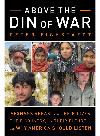
Above the Din of War
Afghans Speak About Their Lives, Their Country, and Their Future - and Why America Should Listen
فرمت کتاب
ebook
تاریخ انتشار
2013
نویسنده
Peter Eichstaedtناشر
Chicago Review Pressشابک
9781613745182
کتاب های مرتبط
- اطلاعات
- نقد و بررسی
- دیدگاه کاربران
نقد و بررسی

January 28, 2013
A veteran journalist and former Afghanistan country director for the Institute for War and Peace Reporting in the Hague interviews a cross-section of Afghans who are invariably passionate, articulate, and free with vivid but sometimes unsettling opinions on the international conflict that has descended on their homeland. Shopkeepers complain about the ongoing violence, Taliban leaders boast about their “swift” and “free” form of justice, and officials try to explain the country’s quandary. Both sexes—but especially women—tell terrible stories of injustice, cruelty, and murder. But some evince hope for a brighter future; female parliamentarian Shukoria Barekzai, though exhausted, exclaims, “I love to work with the truth.” A sophisticated observer, Eichstaedt (Consuming the Congo: War and Conflict Minerals in the World’s Deadliest Place) steps back frequently to emphasize recurring themes, and in the obligatory how-to-fix-it finale, he argues convincingly in support of regional partitioning, but admits that it’s unlikely to happen. These are vivid, mostly sympathetic portraits of Afghans who have weathered decades of chaos, and though a solution still seems far-off, Eichstaedt has done a great service by bringing their perspectives to the American public. 32 photos. Agent: Michele Rubin, Writers House.

March 1, 2013
Veteran journalist Eichstaedt (Consuming the Congo: War and Conflict Minerals in the World's Deadliest Place, 2011, etc.) delivers from Afghanistan a dismal report on that country's continued disintegration and decline and the failure of U.S. efforts to prevent it. When U.S. and coalition forces entered Afghanistan in 2001 and defeated the brutal Taliban regime, hopes ran high for peace and prosperity. Neither, reports the author, has occurred. Rather, Afghanistan remains a country "crumbling at the edges and collapsing at its core." Eichstaedt interviewed Afghans from all walks of life: government officials, Taliban leaders, shopkeepers, mullahs, would-be suicide bombers, victims of self-immolation and others. Afghanistan remains among the poorest nations of the world, and the Taliban grows stronger as a corrupt government dominated by regional and ethnic warlords does little to aid the Afghan people. Women remain brutally oppressed, and chaos reigns: "The fighting, the death, the destruction was random and it was everywhere." Eichstaedt places much of the blame for this mess on the U.S. and its strategy of placing military objectives above development. Among the Afghans Eichstaedt interviewed, an ambiguous view of the U.S. emerged. Some feared the planned withdrawal of U.S. forces in 2014 would surely lead to the return of Taliban control and civil war. Yet many others fiercely hated the Americans and other foreign forces, seeing them as occupiers and conquerors under whom Afghan life had only grown worse. While he does discuss possible strategies for improving the situation--a real and sustained development plan coupled with a continued U.S. military presence, for instance--Eichstaedt sees no easy fixes--nor do most of the Afghans he gives voice to in this work of skilled and brutally honest journalism. Heartbreaking and spellbinding dispatches from a country descending into madness.
COPYRIGHT(2013) Kirkus Reviews, ALL RIGHTS RESERVED.

April 15, 2013
Though Afghanistan is no longer in the headlines the way it was a decade ago, journalist Eichstaedt offers a passionate argument for why the plight of the Afghan people should have the world's attention. When he first visited the country, in 2004, Eichstaedt was impressed by how hopeful the Afghan people were in the wake of the Taliban's expulsion, but when he returned in 2010, he found the country in chaos once again. Hamid Karzai's government is largely ineffective in the more rural areas of the country, where the Taliban have once again gained a foothold. The Afghan reaction to the Taliban is mixed: though they terrorize opposition with kidnapping and executions, in some cases they are the only recourse for justice. Some Afghan women brave death threats in order to participate in government, while others resort to self-immolation to escape abusive home life. Eichstaedt believes things will only get worse once American troops pull out of the country in 2014. Filled with testimony from the Afghan people, this is an eye-opening, important examination of Afghanistan today.(Reprinted with permission of Booklist, copyright 2013, American Library Association.)

























دیدگاه کاربران